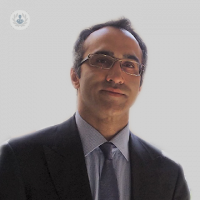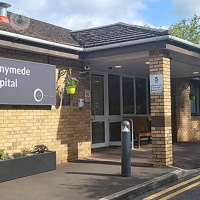What is a macular hole?
A macular hole is a traction hole in the macula, which is the centre of the retina. The macular area of the retina is responsible for providing the high resolution required for everyday activities such as reading.
There are two types of macular hole: lamellar macular holes do not affect the entire thickness of the retina, while full-thickness macular holes do. There are also different stages of macular hole:
- Stage 1: detachment of the fovea (the area of the retina in the centre of the macula)
- Stage 2: full-thickness hole in the fovea
- Stage 3: the hole grows bigger
- Stage 4: the macular hole is associated with posterior vitreous detachment

What is the prognosis?
The outlook is very good. It is very rare for holes to resolve spontaneously, but modern surgical techniques allow more than 90 per cent of cases to be treated successfully.
What are the symptoms of a macular hole?
The main symptoms of a macular hole are loss of central vision and distorted vision in one eye. The distortion causes straight lines to become wavy, such that numbers and letters seem to jump out or distort. Other symptoms include a central grey area, or a blind area in the central vision. In the early stages of the disease, a yellowish lesion can be detected in the fovea.
How is a macular hole diagnosed?
To diagnose a macular hole, the back of the eyes are examined. The specialist dilates the pupils before examining the retina. Optical coherence tomography (OCT) is an examination used to determine the size of the hole, allowing the specialist to determine the prognosis and also to confirm closure of the hole post-operatively.
What causes a macular hole?
Most cases of macular hole are idiopathic, i.e. the macular hole develops in healthy patients without any evidence of other eye diseases. Macular holes are more likely to occur as you get older.
A macular hole may also develop as a result of:
- myopia
- traumatic eye injury
- chronic inflammation of the macula
- intraocular surgery
Can it be prevented?
Macular holes cannot be prevented, although they can be detected in the early stages. The sooner the hole is detected, the better the visual recovery is.
How are macular holes treated?
Macular holes are treated by vitrectomy (removing the innermost retinal layer) followed by the insertion of intraocular gas. In many patients, vitrectomy surgery is combined with cataract surgery to avoid the need for a second procedure.
Patients should assume the gas bubble will block vision for up to one month post operatively before clearing and allowing better vision. Depending on the size of the hole, many surgeons will ask their patients to help close the hole by posturing face down post-operatively for a few days.
Which specialist treats it?
Macular holes are treated by some ophthalmologists who specialise in vitreo-retinal surgery.
01-25-2013 06-07-2023Macular hole
Mr Vaughan Tanner - Ophthalmology
Created on: 01-25-2013
Updated on: 06-07-2023
Edited by: Conor Lynch
What is a macular hole?
A macular hole is a traction hole in the macula, which is the centre of the retina. The macular area of the retina is responsible for providing the high resolution required for everyday activities such as reading.
There are two types of macular hole: lamellar macular holes do not affect the entire thickness of the retina, while full-thickness macular holes do. There are also different stages of macular hole:
- Stage 1: detachment of the fovea (the area of the retina in the centre of the macula)
- Stage 2: full-thickness hole in the fovea
- Stage 3: the hole grows bigger
- Stage 4: the macular hole is associated with posterior vitreous detachment

What is the prognosis?
The outlook is very good. It is very rare for holes to resolve spontaneously, but modern surgical techniques allow more than 90 per cent of cases to be treated successfully.
What are the symptoms of a macular hole?
The main symptoms of a macular hole are loss of central vision and distorted vision in one eye. The distortion causes straight lines to become wavy, such that numbers and letters seem to jump out or distort. Other symptoms include a central grey area, or a blind area in the central vision. In the early stages of the disease, a yellowish lesion can be detected in the fovea.
How is a macular hole diagnosed?
To diagnose a macular hole, the back of the eyes are examined. The specialist dilates the pupils before examining the retina. Optical coherence tomography (OCT) is an examination used to determine the size of the hole, allowing the specialist to determine the prognosis and also to confirm closure of the hole post-operatively.
What causes a macular hole?
Most cases of macular hole are idiopathic, i.e. the macular hole develops in healthy patients without any evidence of other eye diseases. Macular holes are more likely to occur as you get older.
A macular hole may also develop as a result of:
- myopia
- traumatic eye injury
- chronic inflammation of the macula
- intraocular surgery
Can it be prevented?
Macular holes cannot be prevented, although they can be detected in the early stages. The sooner the hole is detected, the better the visual recovery is.
How are macular holes treated?
Macular holes are treated by vitrectomy (removing the innermost retinal layer) followed by the insertion of intraocular gas. In many patients, vitrectomy surgery is combined with cataract surgery to avoid the need for a second procedure.
Patients should assume the gas bubble will block vision for up to one month post operatively before clearing and allowing better vision. Depending on the size of the hole, many surgeons will ask their patients to help close the hole by posturing face down post-operatively for a few days.
Which specialist treats it?
Macular holes are treated by some ophthalmologists who specialise in vitreo-retinal surgery.
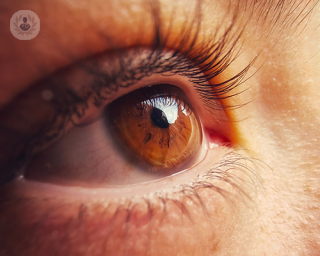

Comprehensive guide to full-thickness macular hole surgery and care
By Professor James Bainbridge
2025-02-10
Macular holes can lead to distorted vision and blind spots. If you have or think you may have a macular hole, surgery provides a promising chance of repairing it and preserving your eyesight. Professor James Bainbridge provides you with an in-depth understanding of macular hole surgery and aftercare. See more
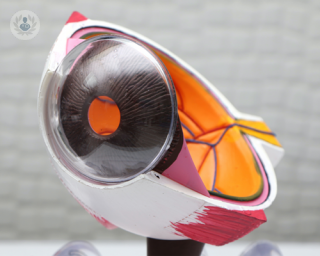

What are macular holes?
By Mr Abdallah Ellabban
2025-02-10
Our vision deteriorates as we get older, one potential cause could be macular holes. But what are macular holes and how do they affect vision? Esteemed consultant ophthalmologist Mr Abdallah Ellabban shares his expertise on the condition. The consultant, who treats patients in East Riding of Yorkshire and Hull, discusses the role of the Amsler grid in monitoring changes in the vision. See more


Macular hole: causes, symptoms and treatment
By Mr Serafeim Antonakis
2025-02-10
Macular hole is a defect or rupture in the tissue of the eye. It can affect the elderly or can be caused by eye trauma. Find out about the causes, symptoms and treatment of this eye condition. See more
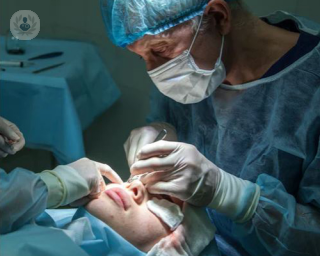

Is macular hole surgery a medical emegency?
By Mr Hadi Zambarakji
2025-02-10
Why is one's macular so important, and what symptoms can be experienced if the macular is affected by any pathology? To find out the answers to these questions and more regarding the macular and macular surgery, read our latest article below, as revered consultant ophthalmologist, Mr Hadi Zambarakji, provides us with an all-you-need-to-know guide. See more
Experts in Macular hole
-
Mr Mahi Muqit
OphthalmologyExpert in:
- Eye floaters
- Epiretinal membrane
- Diabetic retinopathy
- Vitrectomy
- Macular hole
- Retinal detachment
-
Professor James Bainbridge
OphthalmologyExpert in:
- Cataracts
- Epiretinal membrane
- Macular hole
- Retinal detachment
- Eye floaters
- Retinal detachment surgery
-
Professor Tom Williamson
OphthalmologyExpert in:
- Retinal detachment
- Macular hole
- Epiretinal membrane
- Diabetic retinopathy
- Cataracts
- Vitrectomy
-
Mr Hadi Zambarakji
OphthalmologyExpert in:
- Retinal detachment
- Macular hole
- Epiretinal membrane
- Macular degeneration (AMD)
- Diabetic retinopathy
- Cataracts
-
Mr Roger Wong
OphthalmologyExpert in:
- Retina
- Diabetic retinopathy
- Retinal detachment
- Macular hole
- Epiretinal membrane
- Macular degeneration (AMD)
- See all

Optegra Hampshire Eye Hospital
Optegra Hampshire Eye Hospital
Fusion 3, 1200 Parkway, Whiteley, Fareham PO15 7AD
No existe teléfono en el centro.
By using the telephone number provided by TOP DOCTORS, you automatically agree to let us use your phone number for statistical and commercial purposes. For further information, read our Privacy Policy
Top Doctors

The Runnymede Hospital - part of Circle Health Group
The Runnymede Hospital - part of Circle Health Group
Guildford Street, Ottershaw, Lyne, Chertsey KT16 0RQ
No existe teléfono en el centro.
By using the telephone number provided by TOP DOCTORS, you automatically agree to let us use your phone number for statistical and commercial purposes. For further information, read our Privacy Policy
Top Doctors

The Alexandra Hospital - part of Circle Health Group
The Alexandra Hospital - part of Circle Health Group
Mill Ln, Cheadle, SK8 2PX
No existe teléfono en el centro.
By using the telephone number provided by TOP DOCTORS, you automatically agree to let us use your phone number for statistical and commercial purposes. For further information, read our Privacy Policy
Top Doctors
-
Optegra Hampshire Eye Hospital
Fusion 3, 1200 Parkway, Whiteley, Fareham PO15 7AD, FarehamExpert in:
- Blepharoplasty
- Cataracts
- Eyelid surgery
- Laser eye surgery
- Vision correction
-
The Runnymede Hospital - part of Circle Health Group
Guildford Street, Ottershaw, Lyne, Chertsey KT16 0RQ, ChertseyExpert in:
- Cardiology
- Hand surgery
- General Surgery
- Maxillofacial Surgery
- Oral surgery
- Orthopaedic surgery
-
The Alexandra Hospital - part of Circle Health Group
Mill Ln, Cheadle, SK8 2PX, CheadleExpert in:
- Hip
- Cardiology
- Shoulder and elbow
- Paediatrics
- Foot and ankle
- Knee
- See all
- Most viewed diseases, medical tests, and treatments
- Visual impairment
- Diabetic retinopathy
- Retina
- Presbyopia
- Nystagmus
- Myopia
- Hyperopia (farsightedness)
- Eye examination
- Blepharitis
- Astigmatism

